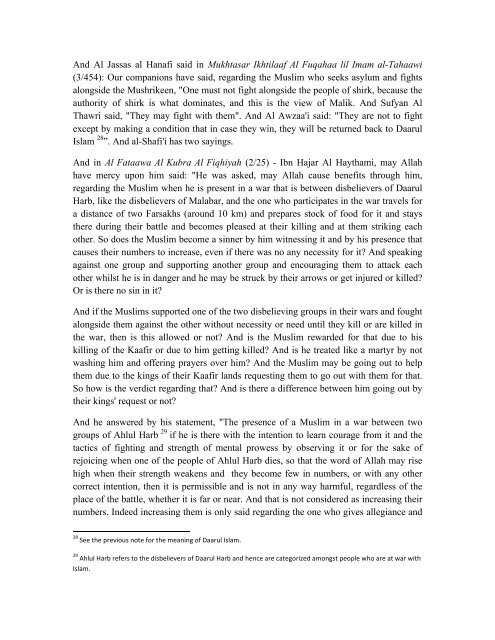abu-maria-book-final
abu-maria-book-final
abu-maria-book-final
Create successful ePaper yourself
Turn your PDF publications into a flip-book with our unique Google optimized e-Paper software.
And Al Jassas al Hanafi said in Mukhtasar Ikhtilaaf Al Fuqahaa lil Imam al-Tahaawi<br />
(3/454): Our companions have said, regarding the Muslim who seeks asylum and fights<br />
alongside the Mushrikeen, "One must not fight alongside the people of shirk, because the<br />
authority of shirk is what dominates, and this is the view of Malik. And Sufyan Al<br />
Thawri said, "They may fight with them". And Al Awzaa'i said: "They are not to fight<br />
except by making a condition that in case they win, they will be returned back to Daarul<br />
Islam 28 ”. And al-Shafi'i has two sayings.<br />
And in Al Fataawa Al Kubra Al Fiqhiyah (2/25) - Ibn Hajar Al Haythami, may Allah<br />
have mercy upon him said: "He was asked, may Allah cause benefits through him,<br />
regarding the Muslim when he is present in a war that is between disbelievers of Daarul<br />
Harb, like the disbelievers of Malabar, and the one who participates in the war travels for<br />
a distance of two Farsakhs (around 10 km) and prepares stock of food for it and stays<br />
there during their battle and becomes pleased at their killing and at them striking each<br />
other. So does the Muslim become a sinner by him witnessing it and by his presence that<br />
causes their numbers to increase, even if there was no any necessity for it? And speaking<br />
against one group and supporting another group and encouraging them to attack each<br />
other whilst he is in danger and he may be struck by their arrows or get injured or killed?<br />
Or is there no sin in it?<br />
And if the Muslims supported one of the two disbelieving groups in their wars and fought<br />
alongside them against the other without necessity or need until they kill or are killed in<br />
the war, then is this allowed or not? And is the Muslim rewarded for that due to his<br />
killing of the Kaafir or due to him getting killed? And is he treated like a martyr by not<br />
washing him and offering prayers over him? And the Muslim may be going out to help<br />
them due to the kings of their Kaafir lands requesting them to go out with them for that.<br />
So how is the verdict regarding that? And is there a difference between him going out by<br />
their kings' request or not?<br />
And he answered by his statement, "The presence of a Muslim in a war between two<br />
groups of Ahlul Harb 29 if he is there with the intention to learn courage from it and the<br />
tactics of fighting and strength of mental prowess by observing it or for the sake of<br />
rejoicing when one of the people of Ahlul Harb dies, so that the word of Allah may rise<br />
high when their strength weakens and they become few in numbers, or with any other<br />
correct intention, then it is permissible and is not in any way harmful, regardless of the<br />
place of the battle, whether it is far or near. And that is not considered as increasing their<br />
numbers. Indeed increasing them is only said regarding the one who gives allegiance and<br />
!!!!!!!!!!!!!!!!!!!!!!!!!!!!!!!!!!!!!!!!!!!!!!!!!!!!!!!!!!!!<br />
28 !See!the!previous!note!for!the!meaning!of!Daarul!Islam.!<br />
29 !Ahlul!Harb!refers!to!the!disbelievers!of!Daarul!Harb!and!hence!are!categorized!amongst!people!who!are!at!war!with!<br />
Islam.!


